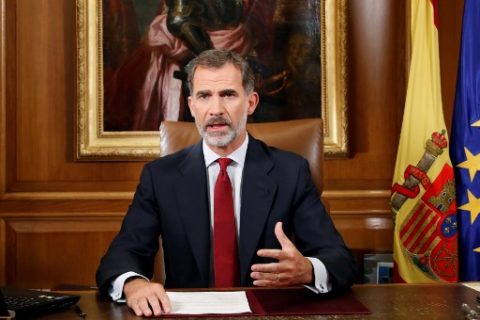
The address by the head of state comes two days after Catalonia’s regional government pressed ahead with a banned independence referendum despite a violent police crackdown that left scores injured./ AFP /
by Marianne Barriaux with Roland Lloyd Parry in Madrid
Agence France Presse
BARCELONA, Spain (AFP) — Spain’s King Felipe intervened dramatically Tuesday in the crisis over Catalan leaders’ bid for independence, accusing them of threatening the country’s stability and urging the state to defend “constitutional order.”
The 49-year-old king abandoned his previously measured tone over tensions with Catalonia as the standoff dragged the country into its deepest political crisis in decades.
He spoke after hundreds of thousands of Catalans rallied in fury at violence by police against voters during a banned referendum on independence for their region on Sunday.
Catalan regional leaders held the vote in defiance of the national government which brands it illegal — as did Felipe on Tuesday.
“With their irresponsible conduct they could put at risk the economic and social stability of Catalonia and all of Spain,” he said of the Catalan leadership.
“They have placed themselves totally outside the law and democracy,” he said.
“It is the responsibility of the legitimate state powers to ensure constitutional order.”
Mass protests
Felipe repeated his earlier calls for harmony between Spaniards, but it was a delicate balancing act for the Spanish sovereign after Sunday’s violence.
People watching in a bar in Barcelona whistled and booed after the king’s speech.
“It is a real disgrace… Far from solving anything it has added fuel to the fire,” said Domingo Gutierrez, a 61-year-old trucker, originally from the southern Andalucia region.
“He did not say a word about the people who were injured… I have never been pro-independence, my parents are from Andalucia. But now I am more for independence than anyone, thanks to people like that.”
Catalans denounce ‘occupation’
Police unions and political experts warned that Spain’s government risks losing control of the north eastern region.
It is considered Spain’s worst political crisis since an attempted military coup in 1981, which was defused by Felipe’s father, King Juan Carlos I.
Crowds in Barcelona on Tuesday yelled for national security forces to get out of the region, branding them “occupation forces” and raising their middle fingers at a police helicopter circling overhead.
“The streets will always be ours,” young protesters yelled.
City police put the number of demonstrators at 700,000.
Barcelona football club refused to train as part of an accompanying strike, which also slowed down public transport and paralysed freight shipments in the port of Barcelona.
Dragged by hair
Pictures of police beating unarmed Catalan voters with batons and dragging some by the hair during Sunday’s ballots drew international criticism.
Catalan regional leader Carles Puigdemont said nearly 900 people had received medical attention on Sunday, though local authorities confirmed a total of 92 injured. Four were hospitalized, two in serious condition.
The national government said more than 400 police officers were hurt.
Government ‘losing control’
Angry protesters earlier rallied outside Catalan hotels where state security forces were lodged, police groups said on Tuesday.
“They are fleeing from hotel to hotel, hiding like rats,” said the spokesman for Spain’s main police union SUP, Ramon Cosio.
Two hotels said local authorities had ordered them to ask police officers staying there to leave. The officers left and were rehoused in barracks, police unions said.
Spanish authorities “are losing control, it is clear,” Javier Perez Royo, a constitutional law professor at the University of Seville, told AFP.
“And the government of the nation is taking steps in a very dangerous direction.”
‘Inciting rebellion’
A rich industrial region of 7.5 million people, Catalonia accounts for a fifth of Spain’s economy.
It has its own language and cultural traditions.
Its claims for independence date back centuries but have surged during recent years of economic crisis.
Madrid blames the Catalan regional authorities for the tensions.
“The government of Catalonia is pushing the population to the abyss and inciting rebellion in the streets,” Spain’s Interior Minister Juan Ignacio Zoido said on Tuesday.
He said his government would take “all measures necessary to stop acts of harassment.”
International call
Puigdemont declared Sunday that Catalonia had “won the right to an independent state.”
His regional government claimed that 2.26 million people took part in the poll, or just over 42 percent of the electorate — but the vote was held without regular electoral lists or observers.
The regional government said 90 percent of those who voted backed independence, but opinion polls indicate Catalans are split.
Puigdemont has said he will present the results to the region’s parliament, where separatist lawmakers hold a majority.
© Agence France-Presse








